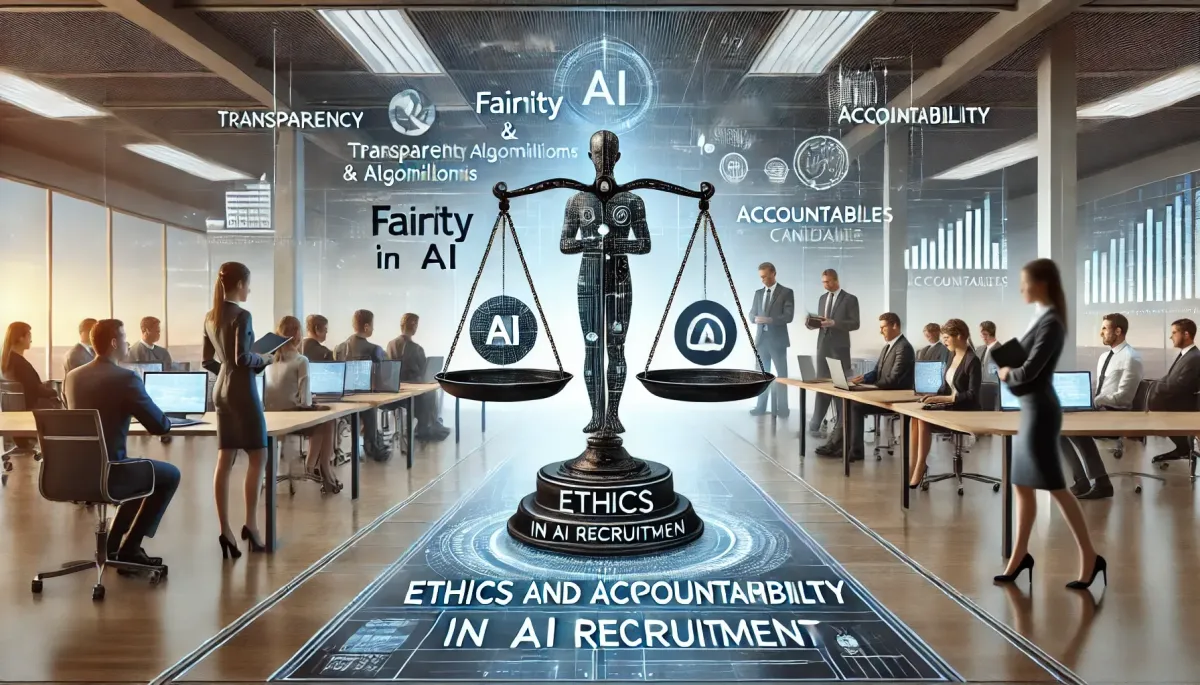
Ethics and Accountability in AI Recruitment
Ethics and Accountability in AI Recruitment

Introduction: Balancing Innovation with Responsibility
Artificial Intelligence (AI) is revolutionizing recruitment processes, offering unparalleled efficiency and insights. However, this innovation demands responsibility to address ethical considerations such as fairness, transparency, and data privacy. These principles ensure that AI does not unintentionally harm candidates or perpetuate biases.
A 2023 PwC Workforce Trends report highlights that 67% of job seekers express concerns about the transparency of AI-driven hiring processes. Organizations must address these concerns to maintain trust and integrity. This chapter explores the ethical dimensions of AI in recruitment and provides actionable guidelines for responsible implementation.
12.1 Understanding Ethical Concerns in AI Recruitment
The transformative potential of AI comes with challenges that require proactive management to avoid unintended consequences:
Bias in Algorithms:
AI systems often learn from historical data, which may embed biases. For instance, Amazon discontinued an AI recruiting tool that favored male candidates for technical roles due to biased training data (Reuters).Transparency and Explainability:
Many candidates feel uneasy about AI decision-making processes. PwC's survey reveals that 67% of job seekers question how algorithms assess qualifications, fearing hidden biases.Data Privacy:
AI tools process sensitive candidate information, raising concerns about compliance with regulations like GDPR. For example, a recruitment agency faced GDPR penalties for mishandling candidate data, underscoring the need for robust protections (European Data Protection Board).
12.2 Principles for Ethical AI Use in Recruitment
To ensure fairness and accountability, organizations should adhere to these principles:
Fairness:
Conduct regular audits to identify and mitigate biases. A multinational company’s audits improved diversity in hires by 15% (Forbes).Transparency:
Inform candidates about AI’s role in hiring decisions. Explainable AI can increase trust; for example, a financial firm’s efforts led to a 20% rise in application rates (SHRM).Accountability:
Assign oversight responsibilities to teams or individuals, ensuring quick identification and resolution of issues.
12.3 Implementing Ethical AI Practices
Responsible implementation of AI requires deliberate actions:
Developing Ethical Guidelines:
Crafting comprehensive policies for AI use helps address data handling, transparency, and bias mitigation. A tech company’s ethical AI framework promoted inclusivity and received industry recognition (TechCrunch).Training Teams:
Equip recruiters with knowledge of AI's capabilities and limitations. A healthcare organization’s training reduced discriminatory outcomes by 15% (Healthcare Hiring Journal).Monitoring AI Systems:
Continuously evaluate AI tools using metrics like candidate satisfaction and diversity ratios to ensure fairness and effectiveness.
12.4 Ensuring Compliance with Regulations
Legal adherence is vital for maintaining ethical AI practices:
GDPR Compliance:
Protect candidate data by offering opt-out options for AI-based assessments and securing information storage. GDPR compliance fosters trust and reduces legal risks.Meeting EEOC Standards:
Align AI systems with Equal Employment Opportunity Commission guidelines to avoid discriminatory practices. Regular audits and bias-detection tools help ensure compliance.
Example: A multinational firm reduced legal risks and enhanced its employer brand by integrating bias-detection technologies (SHRM).
12.5 Building Trust with Candidates
Transparency and communication are key to candidate trust in AI-driven recruitment:
Transparency in Communication:
Clearly inform candidates about AI’s role in hiring. A retail chain’s efforts to explain AI processes improved candidate satisfaction by 25% (Retail HR Journal).Feedback Mechanisms:
Provide detailed feedback based on AI evaluations, helping candidates understand decisions and improve.Human Oversight:
Recruiters should oversee critical decisions, using AI as a supportive tool rather than a replacement.
12.6 The Role of Recruiters in Ethical AI
Recruiters play a pivotal role in championing ethical AI practices:
Advocacy:
Promote policies prioritizing fairness and transparency. Participation in industry forums amplifies their impact.Continuous Learning:
Stay updated on advancements in AI ethics through conferences and courses, ensuring effective advocacy.
12.7 Future Trends in Ethical AI Recruitment
The future of ethical AI will involve:
Bias-Detection Technologies:
Advanced tools will identify and correct biases in real-time, promoting equitable outcomes.Explainable AI:
Systems providing clear justifications for decisions will become the standard in recruitment tools.Global Standards:
International frameworks will guide ethical AI practices, ensuring fairness and compliance across regions.
Summary: A Framework for Responsible AI
Ethics and accountability are fundamental to the future of AI in recruitment. Organizations must prioritize fairness, transparency, and compliance to foster trust and create equitable hiring practices. By implementing the guidelines outlined in this chapter, recruiters can leverage AI responsibly, ensuring it enhances rather than undermines recruitment integrity.
